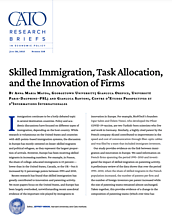Immigration continues to be a hotly debated topic in several destination countries. Policy and academic discussions have focused on different types of immigration, depending on the host country. While research is voluminous on the United States and countries with skill-points-based immigration systems, the discussion in Europe has mostly centered on lesser-skilled migrants and political refugees, as they represent the largest proportion of arrivals. However, Europe has been receiving skilled migrants in increasing numbers. For example, in France, the share of college-educated immigrants is 23 percent— lower than in the United States, Canada, or the UK—but it increased by 11 percentage points between 1995 and 2010.
Recent research has found that skilled immigration has greatly contributed to innovation and patenting activity. Yet most papers focus on the United States, and Europe has been largely overlooked, notwithstanding recent anecdotal evidence of the important role played by immigrants in innovation in Europe. For example, BioNTech’s founders Ugur Sahin and Özlem Türeci, who developed the Pfizer COVID-19 vaccine, are two Turkish-born scientists who live and work in Germany. Similarly, a highly cited patent by the French company Alcatel contributed to improvement in the speed and cost of communication through fiber-optic cables and was filed by a team that included immigrant inventors.
Our study provides evidence on the link between immigration and innovation in Europe. We used information on French firms spanning the period 1995–2010 and investigated the impact of skilled migration on patenting activity. A preliminary review of the data shows that over the period 1995–2010, when the share of skilled migrants in the French population increased, the number of patents per firm and the number of foreign inventors per patent increased while the size of patenting teams remained almost unchanged. Taken together, this provides evidence of a change in the composition of patenting teams (which over time has become more immigrant intensive) and a positive correlation between the number of foreign inventors in patenting teams and the innovation activity of firms.
We studied French districts between 1995 and 2010 and found that the arrival of skilled migrants significantly raised the number of patents. Namely, a 10 percent increase in the share of skilled immigrants led to an average increase of 2.6 patents per 10,000 manufacturing workers. This study provides evidence that the effect of skilled migrants is significantly higher than that of skilled natives, implying that our results are not simply driven by an increase in the size of the skilled labor force. Our estimates show that this effect is strongest for firms that are large, high in productivity, and capital intensive.
The wealth of data available for France allows us to carry out an investigation of the channel through which skilled immigrants are likely to affect innovation and patenting. Past research has shown that immigrants tend to specialize in different tasks compared with similarly skilled natives. An inflow of skilled migrants will lead to a reallocation of workers across tasks, which in turn will increase the productivity of firms—specifically in innovation activity. This is what we found in France. Our study shows that the pro-innovation impact of skilled immigration is driven by a reorganization of tasks within firms: skilled native workers specialize in communication-intensive, managerial tasks while skilled immigrant workers specialize in technical, research-intensive tasks. Each group of workers is reallocated toward the tasks in which it has a comparative advantage, which implies a higher efficiency of the innovation process driven by specialization. Skilled migrants likely specialize in technical tasks over managerial tasks because of the lower language abilities of migrants (compared with natives) or other institutional or social constraints. Indeed, it may be extremely hard for foreign-born workers to access specific managerial occupations. France is special in this regard as the higher education system is set up in such a way that outsiders who did not attend certain specialized institutions (i.e., grandes écoles) are less likely to have access, in practice, to positions high in the hierarchies within firms.
France does not have a large program explicitly targeted at attracting skilled migrants, such as the H‑1B visas program in the United States. However, French migration policy has drastically changed over time in the direction of favoring skilled migration. Before the oil crises of the 1970s, France had an open-door policy that encouraged mostly lesser-skilled immigration. This was followed by severe restrictions in the 1980s and early 1990s aimed at zero immigration. Next came a move in the late 1990s that continues today and favors skilled immigration. More recently, the Macron administration is carrying out reforms of immigration policy aimed at encouraging skilled foreign workers to migrate to the country. These policy changes are consistent with the increase in the share of skilled migrants to France since 1995.
Note:
This research brief is based on Anna Maria Mayda, Gianluca Orefice, and Gianluca Santoni, “Skilled Immigration, Task Allocation and the Innovation of Firms,” CESifo Working Paper no. 10076, November 2022.

This work is licensed under a Creative Commons Attribution-NonCommercial-ShareAlike 4.0 International License.

